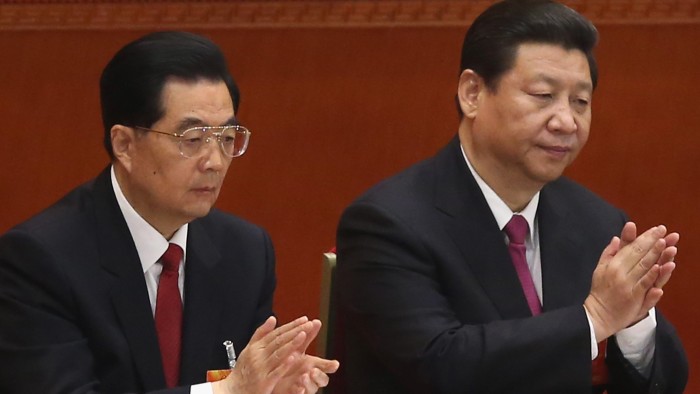China confers more power but not greatness on Xi Jinping


Roula Khalaf, Editor of the FT, selects her favourite stories in this weekly newsletter.
Spare a sympathetic thought for Hu Jintao, the Communist apparatchik who served as China’s president and party general secretary from late 2002 to early 2013.
For many people outside China, and perhaps inside as well, Mr Hu is “Mr Who?” Those who have forgotten might try imagining him as China’s George HW Bush or John Major — a supposedly grey “failure” succeeded by a much more dynamic man.
Everything that his successor Xi Jinping is, Mr Hu was not. Mr Xi is stentorian and eloquent, Mr Hu was reedy-voiced and wooden. China’s current president is strong and feared as he goes from strength to strength. His predecessor was seemingly weak and rudderless.
But just as the first President Bush and Prime Minister Major have enjoyed reputational renaissances after their successors’ personal or tactical failures, could it be time to reassess Mr Hu in a more positive light as well?
Most would say absolutely not, especially after a party plenum last week formally anointed Mr Xi as the party’s “core” leader — a development that excited many Sinologists but was in fact superfluous for a man already regarded as China’s most powerful leader since Deng Xiaoping, if not Mao Zedong.
Even Jiang Zemin, who stabilised China in the decade after the Tiananmen Square massacre, was flattered as a “core” leader, leaving Mr Hu as the odd man out in the pantheon of China’s paramount leaders post-Deng.
According to the conventional wisdom, Mr Hu presided over a “lost decade” of corruption and stalled reforms. Graft did indeed flourish under his watch, with many of his party and military peers amassing vast fortunes.
But also consider his accomplishments. While Mr Jiang and his activist premier, Zhu Rongji, put the Chinese economy on a firm footing by restructuring an insolvent banking system and negotiating China’s accession to the World Trade Organisation, it was Mr Hu who steered it from there.
He inherited what was then the world’s sixth-largest economy and fourth-largest exporter. By the end of his 10 years in office it ranked No 2 and No 1 respectively.
He presided over the greatest infrastructure investment programme in history, helping address the traditional developmental imbalance between China’s coastal and interior regions and cushioning the impact of the global financial crisis.
He did all this while maintaining stable relations with the US and China’s regional neighbours — and also a stable currency when it was in his country’s immediate interest to devalue the renminbi. Nor were there any games of chicken with Japan in the East China Sea or island-building adventurism in the South China Sea that have been two of the defining features Mr Xi’s four years in power.
Even political liberals have reason to yearn for a return to the Hu years.
Mr Hu was admittedly not one of them. He imprisoned China’s only Nobel Peace Prize laureate and set in motion an ongoing crackdown on non-governmental organisations. But on his watch civil society breathed much more easily than it does today. By comparison with Mr Xi’s reign, labour activists and even rights lawyers acted with relative impunity while Mr Hu was in power.
Mr Xi, meanwhile, has been amassing plenty of power and his take-no-prisoners anti-graft campaign has undeniably changed the political landscape, albeit without empowering institutions that could eradicate the root causes of corruption. And inasmuch as the purpose of his power is to enact difficult economic reforms and cement his status as a “transformational” leader, he has not yet delivered.
As Timothy Heath at the Rand Corporation puts it: “The central leadership under Xi is seeking to overcome resistance [to reforms] and adding titles to build Xi’s political capital is part of the process. Whether they can succeed remains an open question.”
It is not inconceivable that Mr Xi may one day envy the record of his supposedly powerless and ineffectual predecessor.
@tmitchpk
Comments